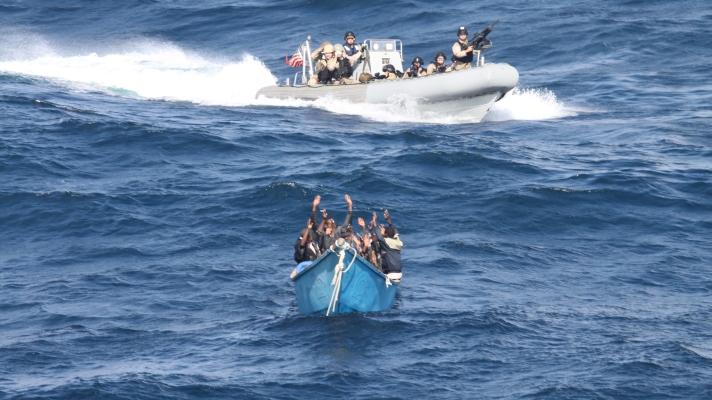Dutch merchant vessels that sail through the pirate-infested Gulf of Aden, but cannot be guarded by Defence, will be allowed to use armed private security as of 1 January. The Council of Ministers agreed on Friday 2 April to a change in the law that has been years in the making. The proposal still has to be approved by Dutch Parliament.
For years, the Gulf of Aden has been a dangerous area because of pirates who hijack ships there. Dutch ships that need to pass through the area can now ask for support from so-called Vessel Protection Detachments (VPDs) supplied by the Ministry of Defence.
If there is no room or money to take military personnel, private security personnel may be called in under certain conditions. The amended law stipulates that security companies can apply for the necessary permission and licence from the Coast Guard and the Human Environment and Transport Inspectorate.
In 2020, five sea transports were secured by a VPD, according to figures published by the Ministry of Defence. In previous years, military personnel were required to accompany merchant vessels much more frequently, with the year 2014 being the high point with 54 secured transports.
The industry organisations KNVR and NVKK and the trade union Nautilus International had asked for an amendment to the law enabling private security. They have also expressed their dissatisfaction with the long bureaucratic process of getting the law enforced as the Dutch House of Representatives already adopted the Merchant Shipping Protection Act in 2018.
Also read: Why does allowing private security on board Dutch ships take so much time?
No solution for Gulf of Guinea
The new law specifically targets the Gulf of Aden. Although piracy is still an issue in this area, it has dwindled over the last years thanks to naval patrols in the area and armed (private or military) protection on board ships. The new hotspot where most kidnappings take place is the Gulf of Guinea. Both VPDs and private security will not yet be available in this area.
Also read: ‘Never before did pirates kidnap so many crew in the Gulf of Guinea’
This is because Somalia on the Gulf of Aden is a so-called “failed state” (it does not have a central government due to an ongoing civil war). In addition, the Gulf of Aden is a transit route, meaning a lot of ships need to go through it. The Gulf of Guinea is not a transit route, but is visited by ships on their way to certain ports and it crosses the territorial waters of different countries, such as Nigeria, Liberia, Ghana, Cameroon and Angola, all with their own capable governments.
To deploy frigates in the Gulf of Guinea or put military or armed personnel on board a ship, the government ruling the territorial waters needs to agree to this. ‘This makes the playing field significantly more complex and getting more security in the area a long, mainly diplomatic process,’ explained Cathelijne Bouwkamp, specialist in maritime law and security at the KVNR, earlier when asked about the delay in approving the law to use private security on board Dutch ships.
Source (in part): ANP








